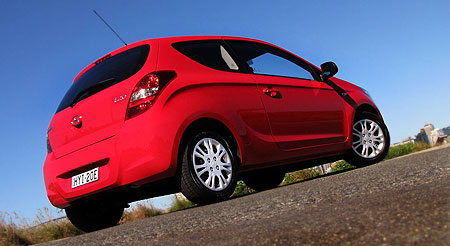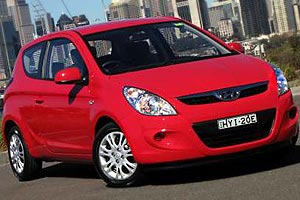 Last month saw the long-awaited release of the Hyundai i20. The i20 is the replacement for Hyundai’s biggest seller … the Getz … a car that’s been around for a long time. One look at the boxy design of the Getz and you’ll realize just how long it’s been since it first hit the showroom floors.
Last month saw the long-awaited release of the Hyundai i20. The i20 is the replacement for Hyundai’s biggest seller … the Getz … a car that’s been around for a long time. One look at the boxy design of the Getz and you’ll realize just how long it’s been since it first hit the showroom floors.
But now the Getz is gone and we have a much smarter design in the i20 but the changes are more than just a new name and some cosmetic surgery. The i20 was designed at Hyundai’s Russelsheim Design Studios in Germany and the focus was on producing a compact that not only looked good but was comfortable, economic and fun to drive.
While it’s easy to see what’s on the outside perhaps it’s the refinements inside the i20 … and some of the safety features … that really separate it from the old Getz. The i20 features such things as fade-out interior lights, illuminated glove box compartment that also includes a cooling system, an information system located above the centre console and increased storage options for small items including your mobile phone.
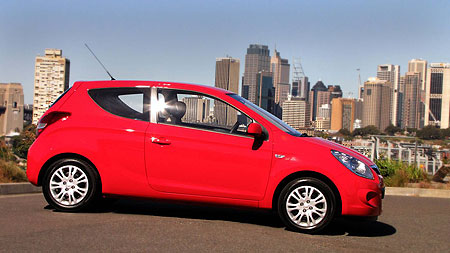
The 120 range
There are three models in the Hyundai i20 range. The base model … the Active … is available in three and five-door versions and comes with a 1.4-litre engine. The mid-range i20 … the Elite is only available as a five door hatch and comes with as 1.6-litre engine. The top of the range Premium is also only available as a five-door hatch and has the same 1.6-litre engine as the Elite.
Engines
Both the 1.4-litre and 1.6-litre engines feature 16-valves and twin-overhead camshafts coupled to either a five-speed manual gearbox or a four-speed electronic HiVec (Hyundai intelligent Vehicle electronic control) auto box.
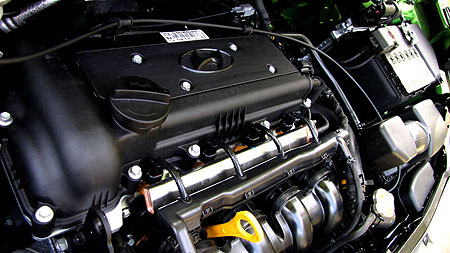
The 1.4-litre engine combined with the manual box will return around 6.0L/100km while the 1.6-litre engine with the manual box adds just 0.1 litres to the fuel consumption. The automatic versions add 0.4L/100km for both engine options.
Safety
The i20 comes complete with an extensive range of safety features. Standard throughout the i20 range is Electronic Stability Control with Traction Control System; a four-channel, four-sensor Anti-ski Braking System and Electronic Brakeforce Distribution.
The front seatbelts in the 120 are fitted with pretensionsers, load limiters and are height adjustable. The child-seat anchorage points and child-proof door locks are standard across the range.
Airbags for driver and front-seat passenger are standard while side airbags and front and rear side curtain airbags are standard on the Elite and Premium models.
The i20 has been designed to absorb and dissipate energy during a frontal collision and rigid cabin and crumple zones front and rear have also been incorporated into the design. Dual side intrusion bars offer added protection in the event of a side impact.
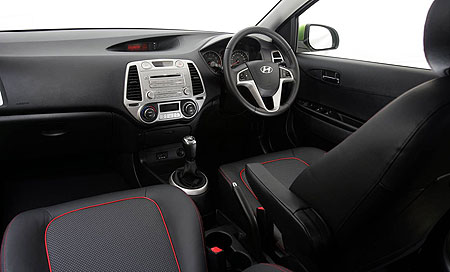
Trim levels
All models come with keyless entry and alarm, folding side mirrors (an option on the three-door Active), glovebox cooling, AUX and USB input as standard. Both the Active and the Elite have cloth-upholstered seats but the Elite has leather on the steering wheel that also incorporates the audio controls, a trip computer, front fog lamps, a cargo net and 15 inch alloy wheels (including a full-size spare).
The Premium i20 comes with full automatic climate control, a combination of leather and cloth upholstered seats, leather on the steering wheel and driver’s armrest and 16 inch alloys (including a full-size spare).
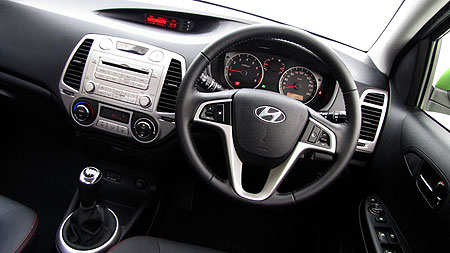
Seating
The seats in the i20 are a complete redesign compared to what was in the Getz. The shape has been enhanced to offer maximum support and comfort. The driver’s seat is now height-adjustable.
The rear seats do have a 60/40 split folding capability.
Comfort
Air conditioning is standard across the range and rear passengers now have ducted ventilation in the foot well.
The audio package features a CD player with MP3, WMA and AM/FM tuner and the auxiliary input and iPod connectivity allows you to add external audio sources.
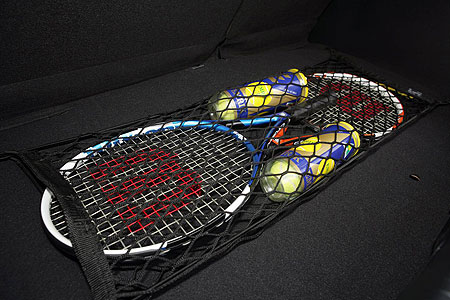
Luggage
Don’t forget that this is a small car so don’t expect any more than 295 litres of space with the rear seats in the upright position. The 60/40 split folding rear seats will add more luggage space.
That’s all quite an impressive list of features for a compact car starting at just $14,990 plus on-road costs for the three-door manual Active and peaking at $23,490 for the five-door automatic Premium and of course you can expect that sooner or later Hyundai will be talking drive-away-no-more-to-pay pricing too.
Will the Hyundai i20 sell as well as the old Getz? You can just about bet your house on the fact that Hyundai is already sitting on a bunch of orders from car hire companies.
But you do have to wonder if Hyundai have missed a share of the market by not including a diesel in the range … they do have a 1.6-litre diesel so why not issue a challenge to Ford’s diesel Fiesta?
